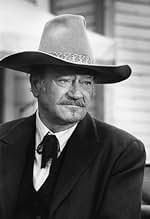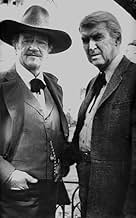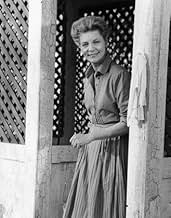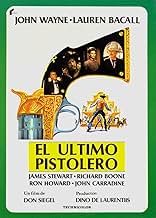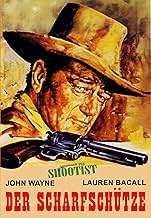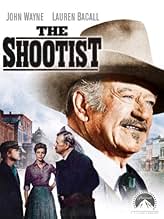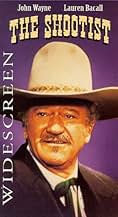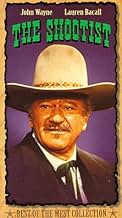Um pistoleiro moribundo passa seus últimos dias procurando uma maneira de morrer com um mínimo de dor e um máximo de dignidade.Um pistoleiro moribundo passa seus últimos dias procurando uma maneira de morrer com um mínimo de dor e um máximo de dignidade.Um pistoleiro moribundo passa seus últimos dias procurando uma maneira de morrer com um mínimo de dor e um máximo de dignidade.
- Direção
- Roteiristas
- Artistas
- Indicado a 1 Oscar
- 1 vitória e 5 indicações no total
- Girl on Streetcar
- (as Melody Thomas)
- Man Outside Metropole
- (não creditado)
- Direção
- Roteiristas
- Elenco e equipe completos
- Produção, bilheteria e muito mais no IMDbPro
Avaliações em destaque
Wayne portrays J. B. Books, the most famous lawman in the West who killed thirty men in his life... Books arrives to Carson City in 1901, the day Queen Victoria died in England...
Wayne went first to get a medical diagnosis known to everyone as cancer.
Dr. Hostetler (James Stewart) was too practical... He gives Book the most potent pain-killer he gets, and tells him where to stay in town...
The film is build to one and only purpose: To let Wayne die with dignity, without physical pain, at the Metropole gambling saloon, in a showdown with three heavies: Richard Boone, a bad-tempered ugly man who wants to avenge his brother's death; Hugh O'Brien, a skilled dealer and a presumptuous gunfighter; and Bill McKinney, an unpleasant provoking gunman just released from prison...
Ron Howard plays the crude graceless adolescent, the first to meet Wayne in the street: 'The old man ain't worth a bullet,' he says, 'he looks all tuckered out.' In this particular scene, it comes to my mind the insolent young punk, Skip Homeir, who tries to prove something when he confronts Gregory Peck in the psychological Western "The Gunfighter."
Wayne seems surprised by the visit of Serepta (Sheree North), an unscrupulous aging lady-love who tries to take advantage of him, asking him to marry her simply for a marriage certificate, and a famous name... She surely was not the woman of quality, the good prostitute (Claire Trevor) in "Stagecoach."
John Carradine, who plays the mysterious passenger, also in "Stagecoach," makes a brief appearance as the undertaker...
Tying to overcome his bloody past, John Wayne shows, in the film, the other side of the 'Shootist,' his human side... We find him pleasantly amusing when he reveals to Stewart the truth about the red fancy cushion he carries in the film...
Filmed in Carson City, Nevada, and with a fine supporting cast, this untraditional motion picture is a lyrical elegiac Western of the highest quality, a moving tribute to a legendary actor and a tender farewell to a Super Star...
The film is a particularly appropriate one for Wayne's last picture. The protagonist he plays is a man at the top of his profession with nowhere left to go. Any opponent who has ever fought him has died at the end of Books' barrel; but now, he is fighting an enemy he cannot hope to face and beat like a man. Whatever he does to fight the cancer, it will just take him anyway. And so, Books searches for a way to go down fighting and to die with dignity, not dying a slow crippling death in his bed.
Books is a character that has many faults. He is a man who has killed thirty men and shows no remorse. As he puts it himself, `I never killed a man who didn't deserve it'. However, despite all his faults, he shows himself to a gentleman of the old school. He is like a knight in armour transplanted to the last days of the Wild West, trying hard to keep all the old values of a dignity and honour alive. He is a man who lives by a code which he believes in, and which he applies to others: `I won't be wronged, I won't be insulted, and I won't be laid a hand on. I don't do these things to other people, and I require the same from them.'
There is no real villain in this film. Books, with all his flaws, is not a bad man. The real villains here are the ordinary people who are all around him in the city, willing to exploit him and use his fame, illness and even his death to further their own wealth. The whole town, from reporters to undertakers, are only too eager to exploit him, with only a few good people being an exception to this tragic rule.
There is no mistaking that this is the Duke's final picture, and not anybody else's film. It is his persona and his charisma that carries and controls the film. The character of Books a rough, tough, but by no means bad, man is very much similar to that of Wayne's own and this film is essentially a vehicle allowing him to have a dramatic swansong befitting a star of his magnitude.
That isn't to say, however, that the others involved with this don't pull their weight. Lauren Bacall delivers well up to her usual standard of acting, presenting a character both strong-spirited and tenderly gentle at once, something which she does extremely well. Ron Howard also acquits himself admirably as her son, turning in a performance which has the same strength and heart as that of his screen-mother Bacall. James Stewart turns in a powerful cameo, adding to the overall poignancy of the whole affair, and Harry Morgan turns in a repellent performance as the contemptible Marshal Thibado. Dirty Harry director Don Seigel directs with skill and ensures that the film remains poignant, but never sentimental. For a western, this film does not have a great deal of action, but such is the quality of acting, direction and scriptwriting, that this doesn't really matter. When the violence does erupt, however, it is occasionally graphic but always exciting. The film's climactic gunfight is a particular highlight and is one of the Duke's best shoot-outs.
This is a powerful, entertaining and enjoyable film, regardless; however, it is further ennobled by it being the Duke's final performance. There is something curiously heart-warming about the whole affair, not least the fact that he is enabled to go out in such great style. This is a must for fans of the western genre, for fans of the Duke, or for anyone who just wants to see a well made, poignant film. Highly recommended. [8]
The film is about both endings and new beginnings, so it is significant that the action takes place in the first month of a new century. January 1901 marked not only the beginning of a century, but also the end of an era, because it was the month in which Queen Victoria died; this event is referred to several times in the film. The days of the `Old West' were also coming to an end; under the influence of new inventions such as the motor car and the telephone (both of which appear in the film) it was becoming a quieter and less lawless place.
The time of year is significant in another way. A film which is about both the end of a man's life and the end of an era will inevitably be elegiac in tone, and the standard way of making it would be to film it in autumn, with plenty of shots of falling leaves and grey, misty skies. Don Siegel, however, takes an alternative approach, setting the film during a brief period of brilliant winter sunshine and mild weather known as a `false spring'. This not only provides some strikingly beautiful images, but also has a double symbolic meaning. For Books and for the Old West it is winter; but for the younger generation, spring is coming. One of the most touching features of the film is the relationship between Books and Gillom, the son of his landlady. Gillom idolises Books and treats him as a hero; Books, in the last days of his life, treats the young man as the son he never had and tries to teach him that there is a better way than that of the gun. The Old West may be passing into history, but there are indications that the New West, although it may be less picturesque, will be a better place in which to live. If winter comes, can spring be far behind?
The film itself also turned out to mark the end of an era in more ways than one. Although there is some doubt whether Wayne actually knew in 1976 that his cancer had returned, we now of course know that it was to be his last film and that he was to die about three years later, and this knowledge makes the film all the more poignant. It was also one of the last of the great Westerns. Although the genre had seemed in reasonable health in the early seventies, it was to suffer, for various reasons, a sharp decline in the second half of the decade and throughout the eighties. Perhaps the standard conventions of the genre had become so familiar that they seemed like clichés; perhaps the post-Vietnam generation had no time for films which often had as their themes honour, glory and courage. (It is notable that the patriotic war film underwent a similar decline at the same time). Certainly, the financial failure of `Heaven's Gate' made investors wary of backing westerns. Even Clint Eastwood, who had seemed to be the heir-apparent to Wayne's crown as King (or should that be Duke?) of the West, abandoned the genre for a time, although he was to return to it triumphantly with `Unforgiven' in the early nineties.
Wayne's great strength as an actor was his ability to convey the tough but honourable man of action. Both these qualities are present in `The Shootist', but he was able to add further qualities, pathos and as sense of a less honourable past. Although Books is hard-bitten and irascible, he is also fundamentally decent, resorting to force only in self-defence. He can show pity- early in the film he spares the life of a villain who tries to rob him at gunpoint, even though he has the man at his mercy. Nevertheless, we are always well aware that he did not gain his fearsome reputation by a scrupulous observance of the Ten Commandments; although this is not an overtly religious film, the story of his last days can be seen as the story of his search for atonement as well as for dignity. In his last film, Wayne achieves one of his greatest performances; it is remarkable that he was not even nominated for an Oscar.
The other performance that stands out is that of Ron Howard as Gillom. Howard, of course, is now best known as a director; if his acting career is remembered it is for his role that bland TV series `Happy Days'. Nevertheless, he was also capable of giving good contributions in films (`American Graffiti' is another example), and here he brings a touching youthful innocence to the part. There are also good contributions from James Stewart as the gentle, dignified doctor and from Lauren Bacall as Gillom's mother. (She has the unusual Christian name Bond, possibly symbolic of the close ties that grow between her and Books at the end of his life).
`The Shootist' is a marvellous film, sombre and elegiac, and yet at the same time with a message of hope. A fitting end to Wayne's career. 9/10.
But even when viewed without that knowledge, The Shootist is a thoughtful, sad and very well acted film. Although I've seen only a handful of Wayne's 200-plus movies, it's hard for me to believe that he ever turned in a better performance than he did here. His portrayal of a terminally ill man wanting to end his life on his own terms is moving and totally convincing. The supporting cast is also outstanding, and Wayne has several great scenes with actors like Jimmy Stewart, Lauren Bacall, Ron Howard and even Scatman Crothers. I found Harry Morgan, whom I usually like, to be a bit cartoonish as the marshall who was anxious to see Wayne's character die as quickly as possible, but that's a minor quibble.
Since the movie takes place in 1901, there are naturally references to the end of the old west and the coming of a new age, and how the time of gunfighters like Wayne's character have come to an end. Again, it is difficult to view these scenes without thinking of the twilight of Wayne's career and the declining popularity of western films, just as you can't help but connect the plight of his character in this film with his own death from cancer a few years later.
It's hard to imagine that any other significant actor ever made a more appropriate and moving farewell film. You don't need to be a fan of westerns, or even a fan of John Wayne, to appreciate The Shootist.
Você sabia?
- CuriosidadesJames Stewart agreed to play a cameo role in the film only because John Wayne had specifically requested him. His brief screen time proved to be rather difficult. The bad acoustics of the huge, hollow sound stages worsened his hearing difficulties, and he stayed by himself most of the time. He and Wayne muffed their lines so often in the main scene between them that director Don Siegel accused them of not trying hard enough. Wayne's reply was a variation on an old John Ford line, advising the director, "If you'd like the scene done better, you'd better get a couple of better actors." Later on, the star told friends that Stewart had known his lines, but hadn't been able to hear his cues, and that in turn had caused his own fumbling.
- Erros de gravaçãoBooks' hair (John Wayne's toupee) goes from being parted on his left to his right then back to his left after he tells Marshal Thibido he's a dying man when they first talk in Books' room.
- Citações
Gillom Rogers: [first lines, voiceover] His name was J.B. Books, and he had a matching pair of 45's with antique ivory grips that were something to behold. He wasn't an outlaw. The fact is for a while he was a lawman. Long before I met Mr. Books, he was a famous man. I guess his fame was why somebody or other was always after him. The wild country had taught him to survive. He lived his life and herded by himself. He had a credo that went:
John Bernard Books: I won't be wronged, I won't be insulted, and I won't be laid a hand on. I don't do these things to other people, and I require the same from them.
- ConexõesFeatured in Sneak Previews: The Top Ten Films of 1976 (1977)
- Trilhas sonorasWillow, Tit Willow
Music by Arthur Sullivan
Lyrics by W.S. Gilbert
Performed by John Wayne & Lauren Bacall
Principais escolhas
- How long is The Shootist?Fornecido pela Alexa
Detalhes
- Data de lançamento
- País de origem
- Idioma
- Também conhecido como
- El último pistolero
- Locações de filme
- Empresa de produção
- Consulte mais créditos da empresa na IMDbPro
Bilheteria
- Faturamento bruto nos EUA e Canadá
- US$ 8.091.910
- Faturamento bruto mundial
- US$ 8.091.910
- Tempo de duração
- 1 h 40 min(100 min)
- Cor
- Mixagem de som
- Proporção
- 1.85 : 1


